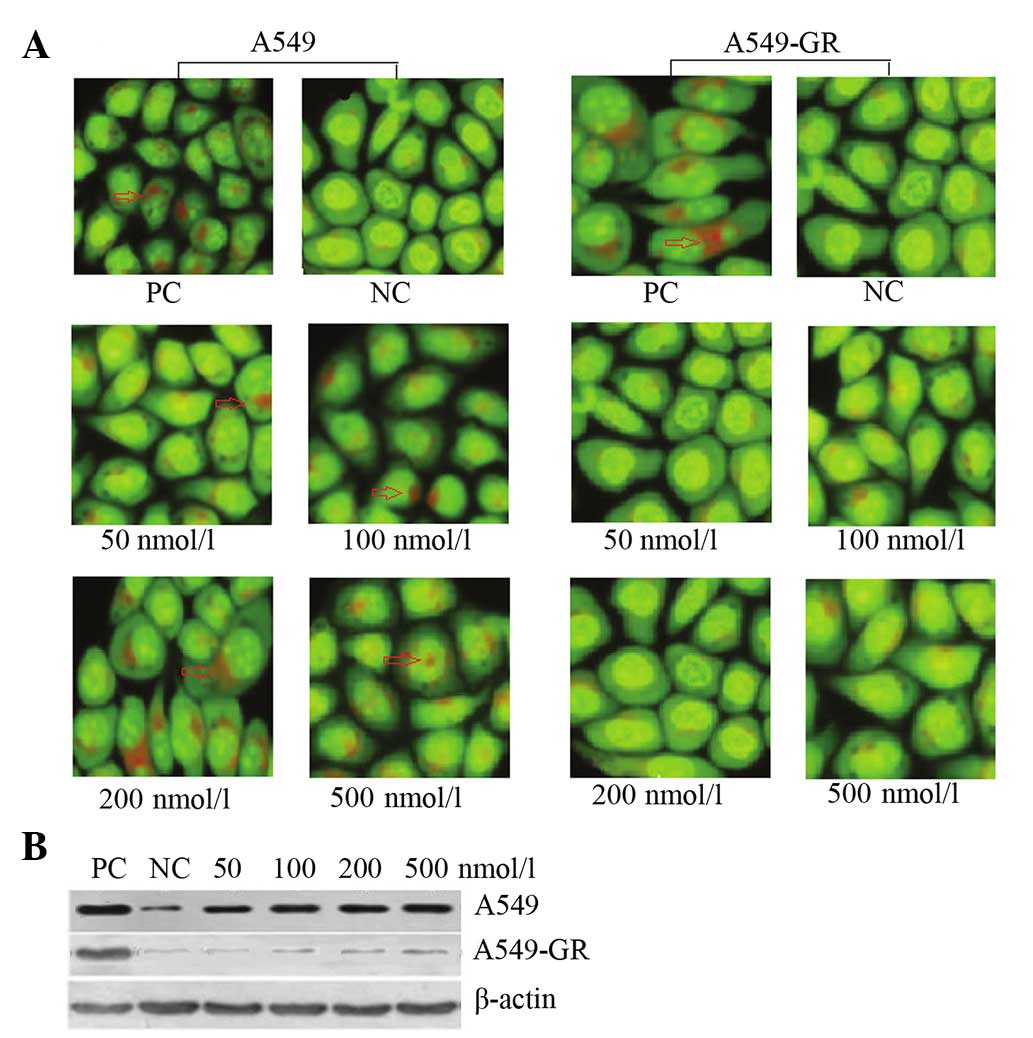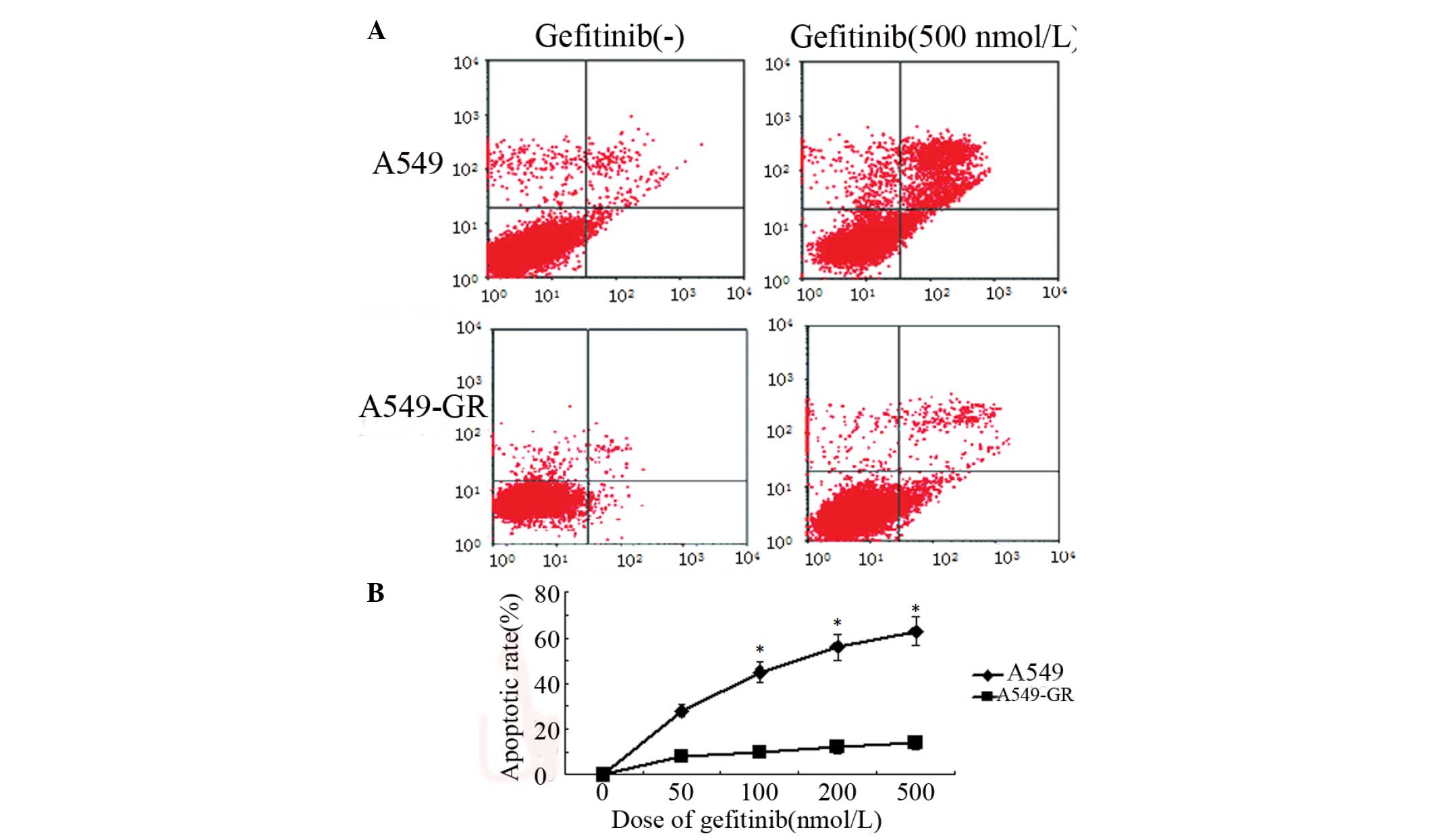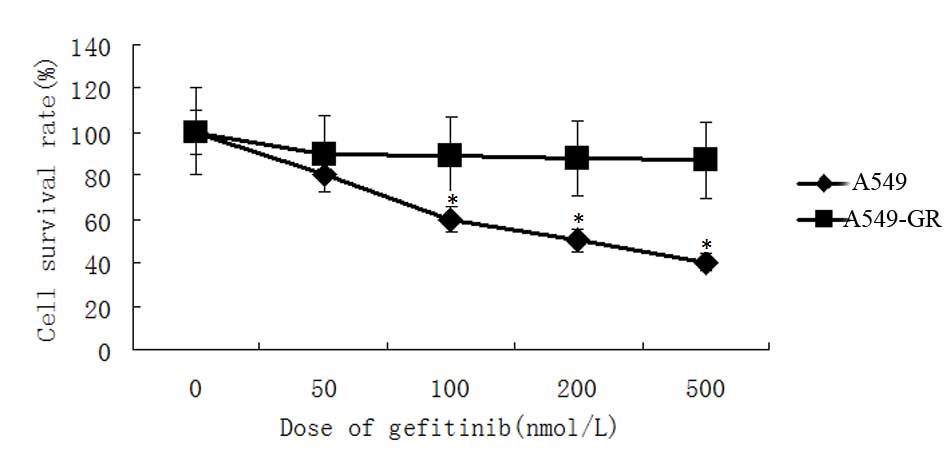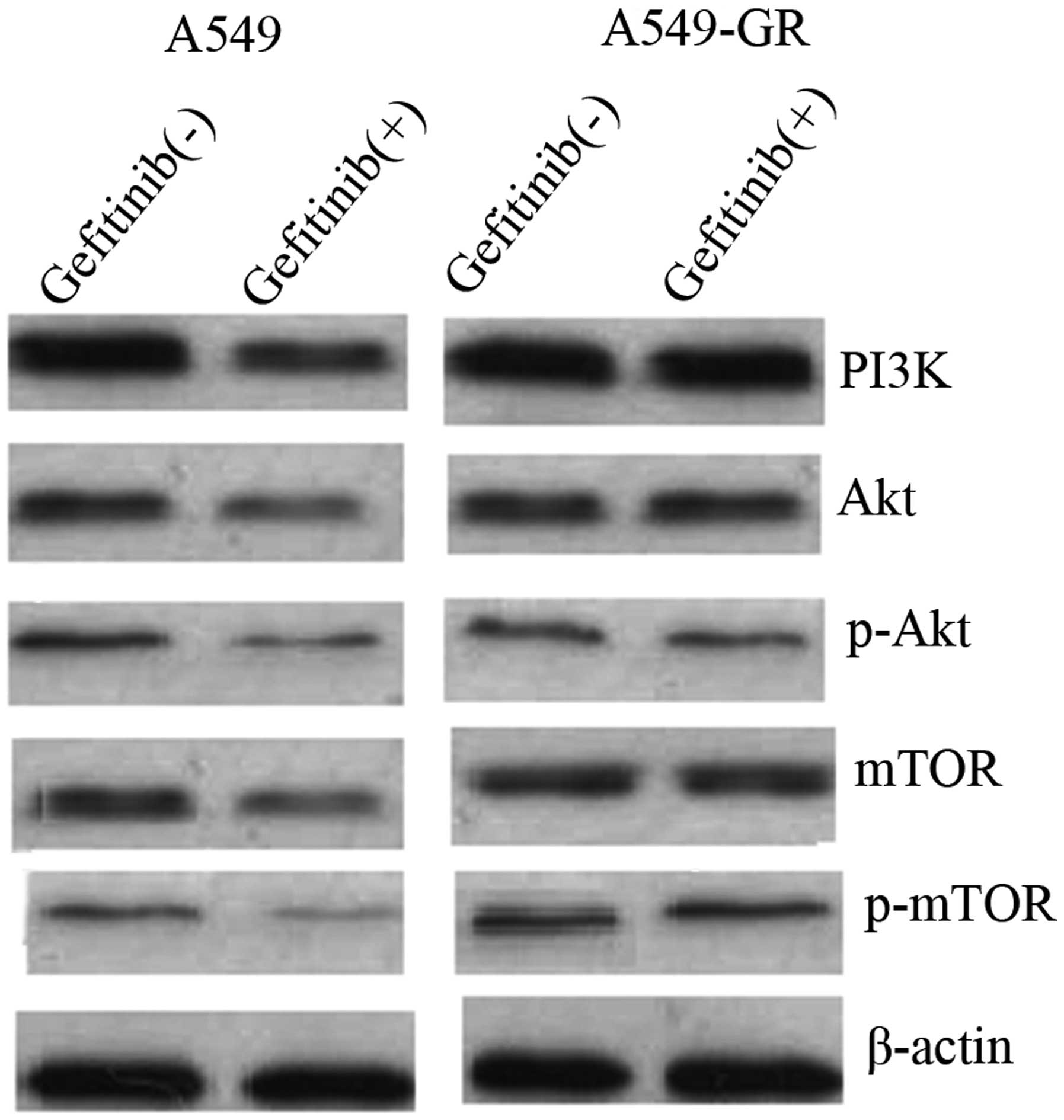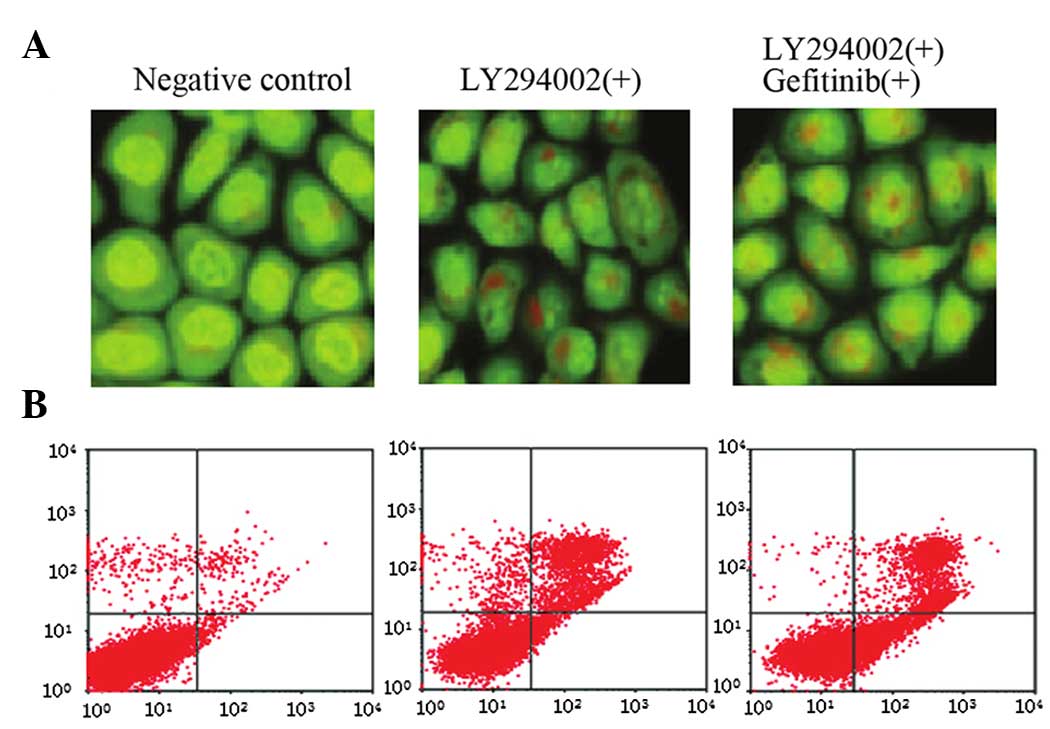|
1
|
Hernández-Hernández JR, de Moreno
Vega-Herrero MB, Iglesias-Heras M, García-García R,
Hernández-Terciado F and Celdrán-Gil J: Lung cancer in avila
province, Spain. Incidence rates, epidemiolgy of the year 2012 and
trends in the last 20 years. Semergen. 41:362–369. 2015.(In
Spanish). View Article : Google Scholar : PubMed/NCBI
|
|
2
|
Ostroff JS: Quality lung cancer screening
protects quality of life: No harm, no foul. Cancer. 120:3275–3276.
2014. View Article : Google Scholar : PubMed/NCBI
|
|
3
|
Maemondo M: Lung cancer: Progress in
diagnosis and treatments. Topics: iii. Treatment; 3. Chemotherapy
for patients with non-small cell lung cancer, 2) Driver mutation
and molecular-targeted therapy in lung cancer. Nihon Naika Gakkai
Zasshi. 103:1314–1321. 2014.(In Japanese). View Article : Google Scholar : PubMed/NCBI
|
|
4
|
Martinez P, Martinez-Marti A, Navarro A,
Cedrés S and Felip E: Molecular targeted therapy for early-stage
non-small-cell lung cancer: Will it increase the cure rate? Lung
Cancer. 84:97–100. 2014. View Article : Google Scholar : PubMed/NCBI
|
|
5
|
Printz C: Targeted therapy in lung cancer:
Survival, quality of life improved for some patients. Cancer.
120:2625–2626. 2014. View Article : Google Scholar : PubMed/NCBI
|
|
6
|
Zhao H, Fan Y, Ma S, Song X, Han B, Cheng
Y, Huang C, Yang S, Liu X, Liu Y, et al: Final overall survival
results from a phase iii, randomised, placebo-controlled,
parallel-group study of gefitinib versus placebo as maintenance
therapy in patients with locally advanced or metastatic
non-small-cell lung cancer (INFORM; C-tong 0804). J Thorac Oncol.
10:655–664. 2015. View Article : Google Scholar : PubMed/NCBI
|
|
7
|
Yu H, Zhang J, Wu X, Luo Z, Wang H, Sun S,
Peng W, Qiao J, Feng Y, Wang J and Chang J: A phase II randomized
trial evaluating gefitinib intercalated with pemetrexed/platinum
chemotherapy or pemetrexed/platinum chemotherapy alone in
unselected patients with advanced non-squamous non-small cell lung
cancer. Cancer Biol Ther. 15:832–839. 2014. View Article : Google Scholar : PubMed/NCBI
|
|
8
|
Yang Z and Klionsky DJ: Eaten alive: A
history of macroautophagy. Nat Cell Biol. 12:814–822. 2010.
View Article : Google Scholar : PubMed/NCBI
|
|
9
|
Apel A, Zentgraf H, Büchler MW and Herr I:
Autophagy-A double-edged sword in oncology. Int J Cancer.
125:991–995. 2009. View Article : Google Scholar : PubMed/NCBI
|
|
10
|
Xu Y, Xia X and Pan H: Active autophagy in
the tumor microenvironment: A novel mechanism for cancer
metastasis. Oncol Lett. 5:411–416. 2013.PubMed/NCBI
|
|
11
|
Dragowska WH, Weppler SA, Wang JC, Wong
LY, Kapanen AI, Rawji JS, Warburton C, Qadir MA, Donohue E, Roberge
M, et al: Induction of autophagy is an early response to gefitinib
and a potential therapeutic target in breast cancer. PLoS One.
8:e765032013. View Article : Google Scholar : PubMed/NCBI
|
|
12
|
Xu Z, Hang J, Hu J and Gao B: Gefitinib,
an egfr tyrosine kinase inhibitor, activates autophagy through AMPK
in human lung cancer cells. J BUON. 19:466–473. 2014.PubMed/NCBI
|
|
13
|
Bokobza SM, Jiang Y, Weber AM, Devery AM
and Ryan AJ: Combining AKT inhibition with chloroquine and
gefitinib prevents compensatory autophagy and induces cell death in
EGFR mutated NSCLC cells. Oncotarget. 5:4765–4778. 2014. View Article : Google Scholar : PubMed/NCBI
|
|
14
|
Zhan Z, Xie X, Cao H, Zhou X, Zhang XD,
Fan H and Liu Z: Autophagy facilitates TLR4- and TLR3-triggered
migration and invasion of lung cancer cells through the promotion
of TRAF6 ubiquitination. Autophagy. 10:257–268. 2014. View Article : Google Scholar : PubMed/NCBI
|
|
15
|
Lee CH: A mechanistic study on
gefitinib-induced apoptosis reveals a new link between EGFR and
hTERT in breast cancers. Arch Pharm Res. 32:1333–1334. 2009.
View Article : Google Scholar : PubMed/NCBI
|
|
16
|
Chang CY, Shen CC, Su HL and Chen CJ:
Gefitinib induces apoptosis in human glioma cells by targeting bad
phosphorylation. J Neurooncol. 105:507–522. 2011. View Article : Google Scholar : PubMed/NCBI
|
|
17
|
Wu J, Min R, Wu M and Chen W: Gefitinib
induces mitochondrial-dependent apoptosis in Saccharomyces
cerevisiae. Mol Med Rep. 4:357–362. 2011. View Article : Google Scholar : PubMed/NCBI
|
|
18
|
Lu PH, Kuo TC, Chang KC, Chang CH and Chu
CY: Gefitinib-induced epidermal growth factor receptor-independent
keratinocyte apoptosis is mediated by the JNK activation pathway.
Br J Dermatol. 164:38–46. 2011. View Article : Google Scholar : PubMed/NCBI
|
|
19
|
Karim NA, Musaad S, Zarzour A, Patil S and
Jazieh AR: Phase II clinical trial of gefitinib for the treatment
of chemonaive patients with advanced non-small cell lung cancer
with poor performance status. Clin Med Insights Oncol. 8:121–128.
2014.PubMed/NCBI
|
|
20
|
Tamiya A, Tamiya M, Shiroyama T, Saijo N,
Nakatani T, Minomo S, Tsuji T, Takeuchi N, Omachi N, Kurata K, et
al: Phase II trial of carboplatin, S-1 and gefitinib as first-line
triplet chemotherapy for advanced non-small cell lung cancer
patients with activating epidermal growth factor receptor
mutations. Med Oncol. 32:402015. View Article : Google Scholar : PubMed/NCBI
|
|
21
|
Ko R, Kenmotsu H, Hisamatsu Y, Akamatsu H,
Omori S, Nakashima K, Oyakawa T, Wakuda K, Shukuya T, Ono A, et al:
The effect of gefitinib in patients with postoperative recurrent
non-small cell lung cancer harboring mutations of the epidermal
growth factor receptor. Int J Clin Oncol. 20:668–673. 2015.
View Article : Google Scholar : PubMed/NCBI
|
|
22
|
Sun WL, Lan D, Gan TQ and Cai ZW:
Autophagy facilitates multidrug resistance development through
inhibition of apoptosis in breast cancer cells. Neoplasma.
62:199–208. 2015. View Article : Google Scholar : PubMed/NCBI
|
|
23
|
Alayev A, Berger SM, Kramer MY, Schwartz
NS and Holz MK: The combination of rapamycin and resveratrol blocks
autophagy and induces apoptosis in breast cancer cells. J Cell
Biochem. 116:450–457. 2015. View Article : Google Scholar : PubMed/NCBI
|
|
24
|
Song X, Kim SY, Zhang L, Tang D, Bartlett
DL, Kwon YT and Lee YJ: Role of AMP-activated protein kinase in
cross-talk between apoptosis and autophagy in human colon cancer.
Cell Death Dis. 5:e15042014. View Article : Google Scholar : PubMed/NCBI
|
|
25
|
An HK, Kim KS, Lee JW, Park MH, Moon HI,
Park SJ, Baik JS, Kim CH and Lee YC: Mimulone-induced autophagy
through p53-mediated AMPK/mTOR pathway increases caspase-mediated
apoptotic cell death in A549 human lung cancer cells. PLoS One.
9:e1146072014. View Article : Google Scholar : PubMed/NCBI
|
|
26
|
Lu HY, Chang YJ, Fan NC, Wang LS, Lai NC,
Yang CM, Wu LC and Ho JA: Synergism through combination of
chemotherapy and oxidative stress-induced autophagy in A549 lung
cancer cells using redox-responsive nanohybrids: A new strategy for
cancer therapy. Biomaterials. 42:30–41. 2015. View Article : Google Scholar : PubMed/NCBI
|
|
27
|
Lee TG, Jeong EH, Kim SY, Kim HR and Kim
CH: The combination of irreversible EGFR TKIs and SAHA induces
apoptosis and autophagy-mediated cell death to overcome acquired
resistance in EGFR T790m-mutated lung cancer. Int J Cancer.
136:2717–2729. 2015. View Article : Google Scholar : PubMed/NCBI
|
|
28
|
Wu G, Li H, Ji Z, Jiang X, Lei Y and Sun
M: Inhibition of autophagy by autophagic inhibitors enhances
apoptosis induced by bortezomib in non-small cell lung cancer
cells. Biotechnol Lett. 36:1171–1178. 2014. View Article : Google Scholar : PubMed/NCBI
|
|
29
|
Xu Z, Hang J, Hu J and Gao B: Gefitinib,
an EGFR tyrosine kinase inhibitor, activates autophagy through AMPK
in human lung cancer cells. J BUON. 19:466–473. 2014.PubMed/NCBI
|
|
30
|
Davis NM, Sokolosky M, Stadelman K, Abrams
SL, Libra M, Candido S, Nicoletti F, Polesel J, Maestro R, D'Assoro
A, et al: Deregulation of the EGFR/PI3K/PTEN/AKT/mTORC1 pathway in
breast cancer: Possibilities for therapeutic intervention.
Oncotarget. 5:4603–4650. 2014. View Article : Google Scholar : PubMed/NCBI
|
|
31
|
Duan H, Qu L and Shou C: Activation of
EGFR-PI3K-AKT signaling is required for mycoplasma
hyorhinis-promoted gastric cancer cell migration. Cancer Cell Int.
14:1352014. View Article : Google Scholar : PubMed/NCBI
|
|
32
|
Heras-Sandoval D, Pérez-Rojas JM,
Hernández-Damián J and Pedraza-Chaverri J: The role of
PI3K/AKT/mTOR pathway in the modulation of autophagy and the
clearance of protein aggregates in neurodegeneration. Cell Signal.
26:2694–2701. 2014. View Article : Google Scholar : PubMed/NCBI
|
|
33
|
Liu M, Li CM, Chen ZF, Ji R, Guo QH, Li Q,
Zhang HL and Zhou YN: Celecoxib regulates apoptosis and autophagy
via the PI3K/Akt signaling pathway in SGC-7901 gastric cancer
cells. Int J Mol Med. 33:1451–1458. 2014.PubMed/NCBI
|
|
34
|
Wang C, Zhang X, Teng Z, Zhang T and Li Y:
Downregulation of PI3K/Akt/mTOR signaling pathway in
curcumin-induced autophagy in APP/PS1 double transgenic mice. Eur J
Pharmacol. 740:312–320. 2014. View Article : Google Scholar : PubMed/NCBI
|
|
35
|
Datta K, Suman S and Fornace AJ: Radiation
persistently promoted oxidative stress, activated mTOR via
PI3K/AKT, and downregulated autophagy pathway in mouse intestine.
Int J Biochem Cell Biol. 57:167–176. 2014. View Article : Google Scholar : PubMed/NCBI
|
|
36
|
Shien T, Doihara H, Hara H, Takahashi H,
Yoshitomi S, Taira N, Ishibe Y, Teramoto J, Aoe M and Shimizu N:
PLC and PI3K pathways are important in the inhibition of
EGF-induced cell migration by gefitinib (‘Iressa’, ZD1839). Breast
Cancer. 11:367–373. 2004. View Article : Google Scholar : PubMed/NCBI
|
|
37
|
Deng M, Wang J, Chen Y, Zhang L and Liu D:
Combination of SF1126 and gefitinib induces apoptosis of
triple-negative breast cancer cells through the PI3K/AKT-mTOR
pathway. Anticancer Drugs. 26:422–427. 2015. View Article : Google Scholar : PubMed/NCBI
|
|
38
|
Jeannot V, Busser B, Brambilla E, Wislez
M, Robin B, Cadranel J, Coll JL and Hurbin A: The PI3K/AKT pathway
promotes gefitinib resistance in mutant KRAS lung adenocarcinoma by
a deacetylase-dependent mechanism. Int J Cancer. 134:2560–2571.
2014. View Article : Google Scholar : PubMed/NCBI
|
|
39
|
Li H, Schmid-Bindert G, Wang D, Zhao Y,
Yang X, Su B and Zhou C: Blocking the PI3K/AKT and MEK/ERK
signaling pathways can overcome gefitinib-resistance in non-small
cell lung cancer cell lines. Adv Med Sci. 56:275–284. 2011.
View Article : Google Scholar : PubMed/NCBI
|















